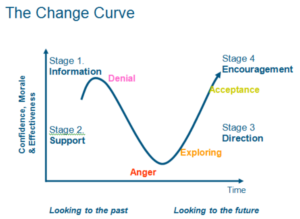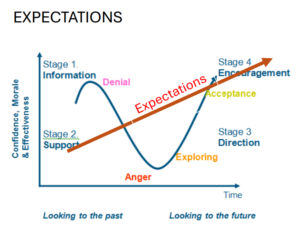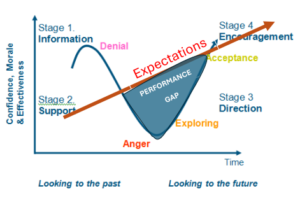Change is an inevitable part of life. From bereavement to marriage, new job to
moving home. These are all examples of change. Whilst all change is difficult to
cope with, changes in a personal environment often come with help and where the
open expression óf emotion is encouraged.
However change at work is difficult to cope with. You may have been promoted,
have a new manager or just a change of responsibilities. These all come with the
requirement to cope with change.
The Change Curve is based on a model developed in the 1960s by Elizabeth KublerRoss to explain the grieving processSince then it has been widely utilised as a
method of helping people understand their reactions to significant change and find
ways to cope with them.
It comes wirh four key stages people tend to go through as they experience change:
Shock / Denial, Anger / Fear, Acceptance and Commitment.

There are many learned journals on applying the change curve to one’s life, so we
ahsll not dwell further on how to cope with change in your personal life.
Change at work.
The workplace is in a constant state of change. You will experience all of the same
stages of change as you would at home.

Wherever you are on the change curve, it is a rare employer indeed who accept a
reduced performance whilst you learn to cope with changes.
Expectations almost are always almost always linear

Promotion / New Role
This is where you are at your most vulnerable and yet where expectations are at
their highest, this is the Performance Gap.
You need to manage the Performance Gap effectively and quietly. Balancing
expectations and acceptable performance is all about effective communication.
Some managers are happy to indulge in an open conversation with you. However,
alpha (male or female) environments continue to exist and need to be managed
carefully. It is rarely a good idea to be open about emotions at work, other than with
a small group of people that you believe to be friends – end even then sparingly.
Power Imbalance
Formal and informal power hierarchy exists everywhere, especially in work
environments. Your responsibility is to yourself first and everyone else second.
Managing the power gap and finding your place within it are critical to successful
management of change.
We can help you manage this imbalance and navigate a successful route to
success. We have helped people navigate change for the past 25 years and build
very successful careers as a result.

